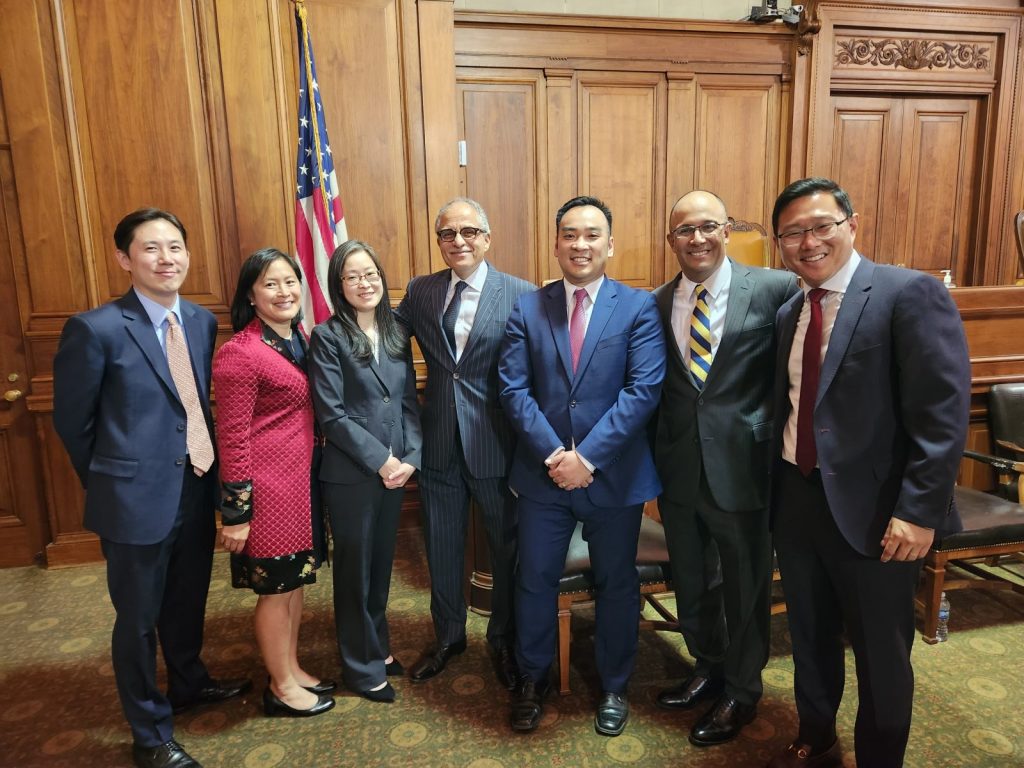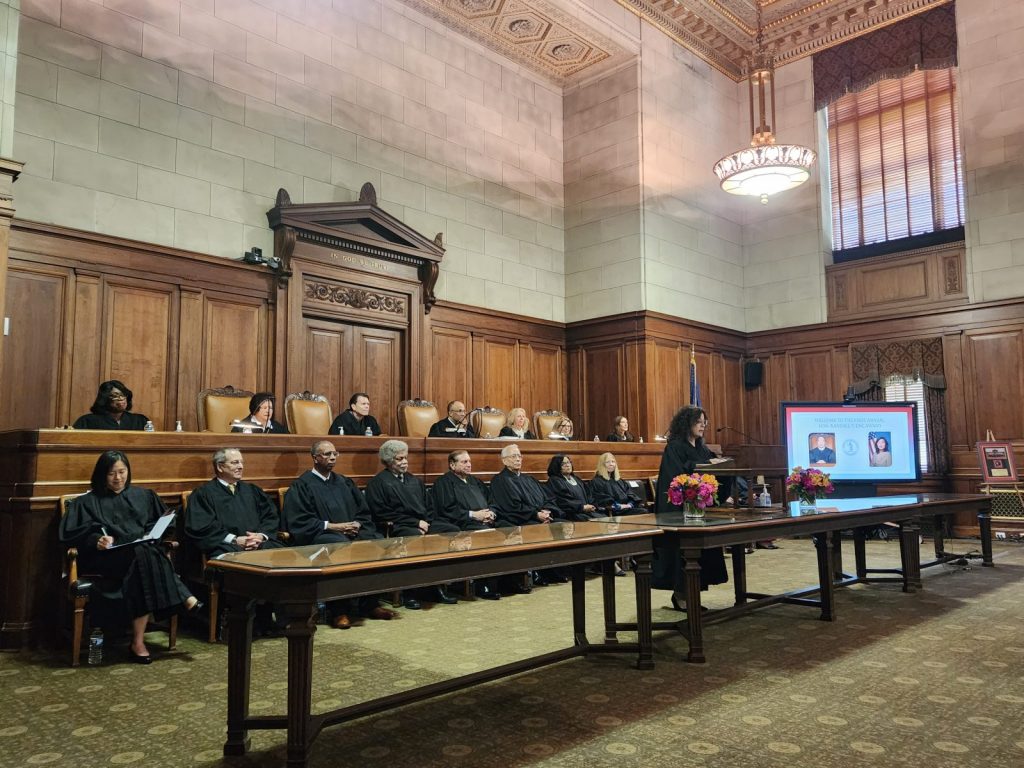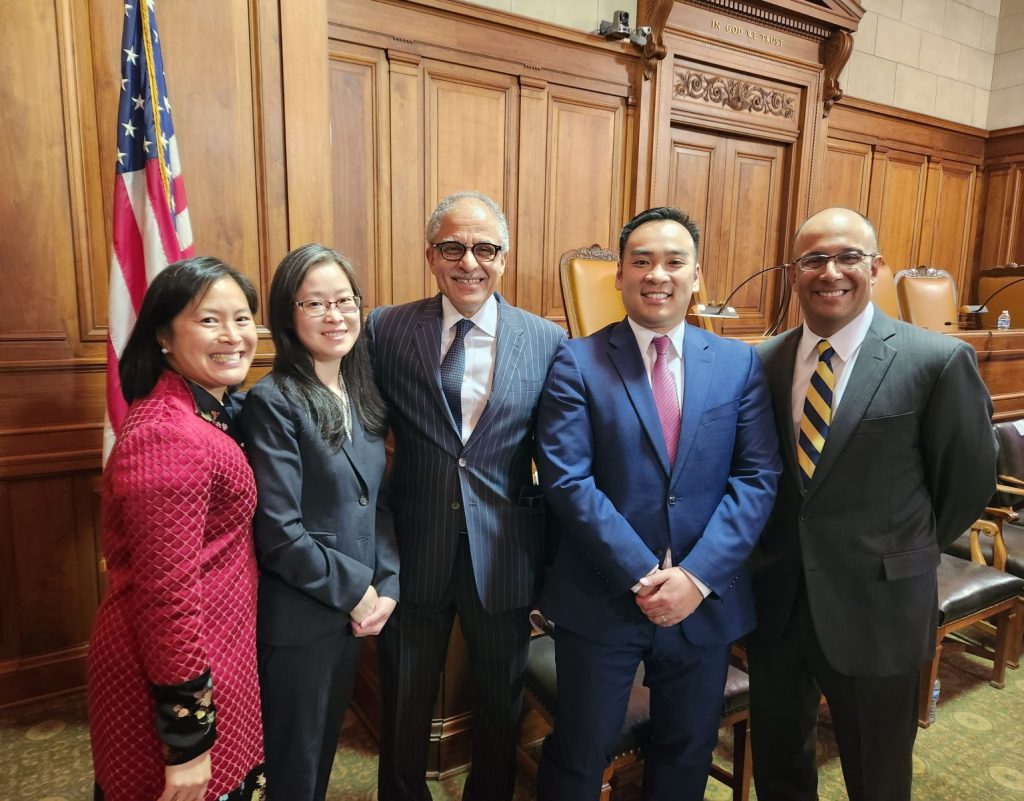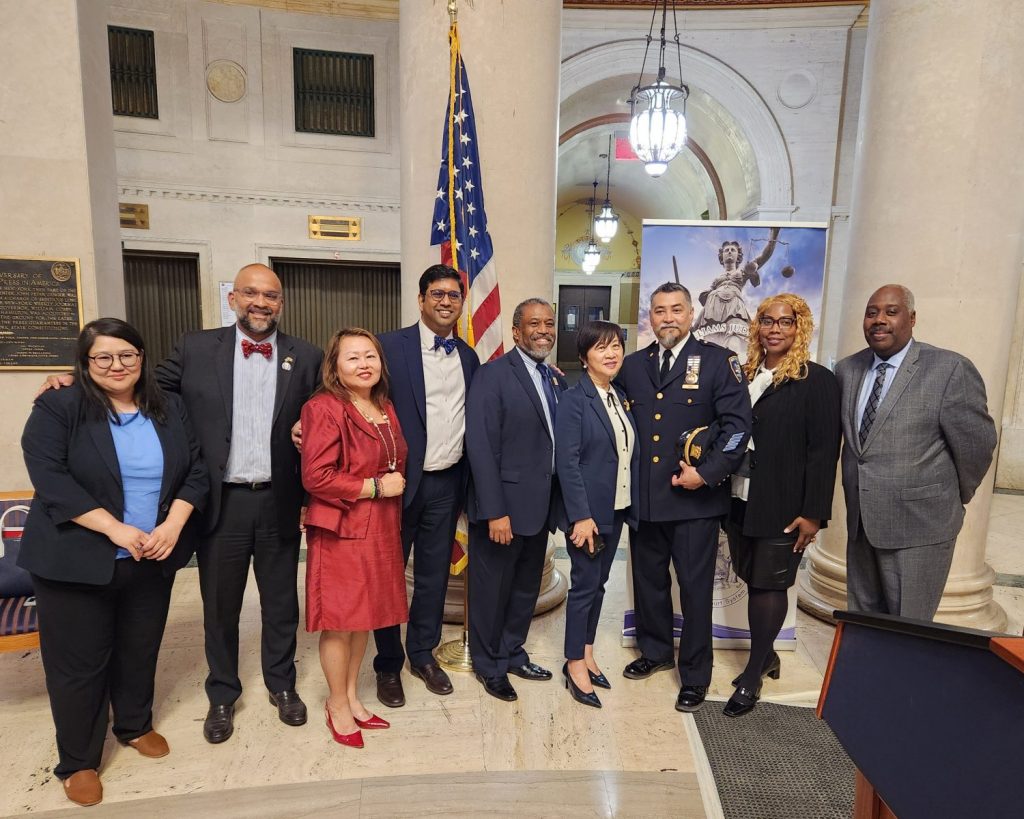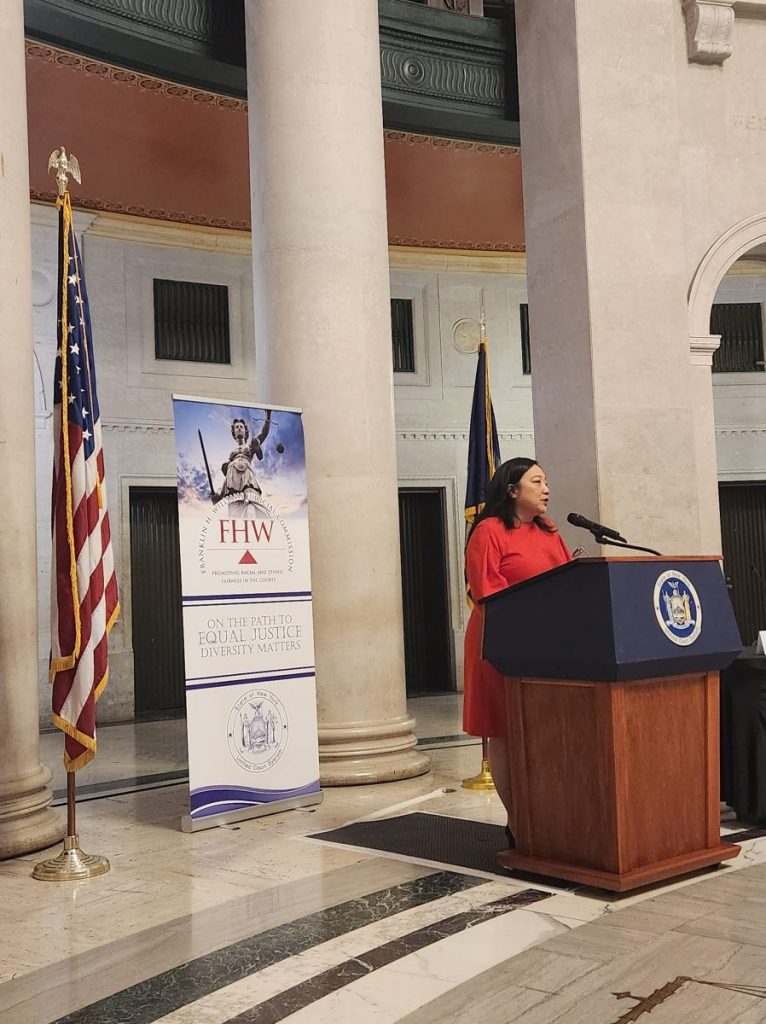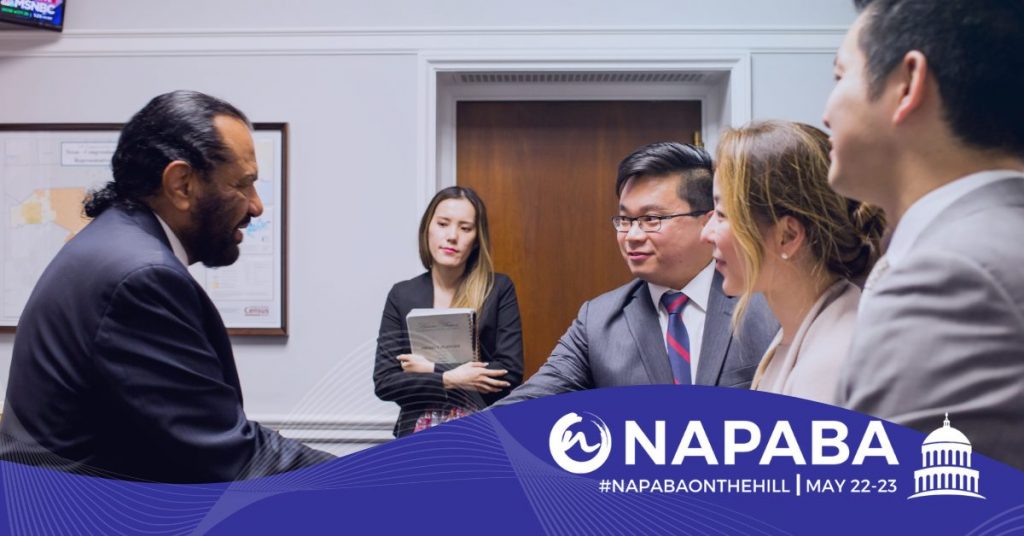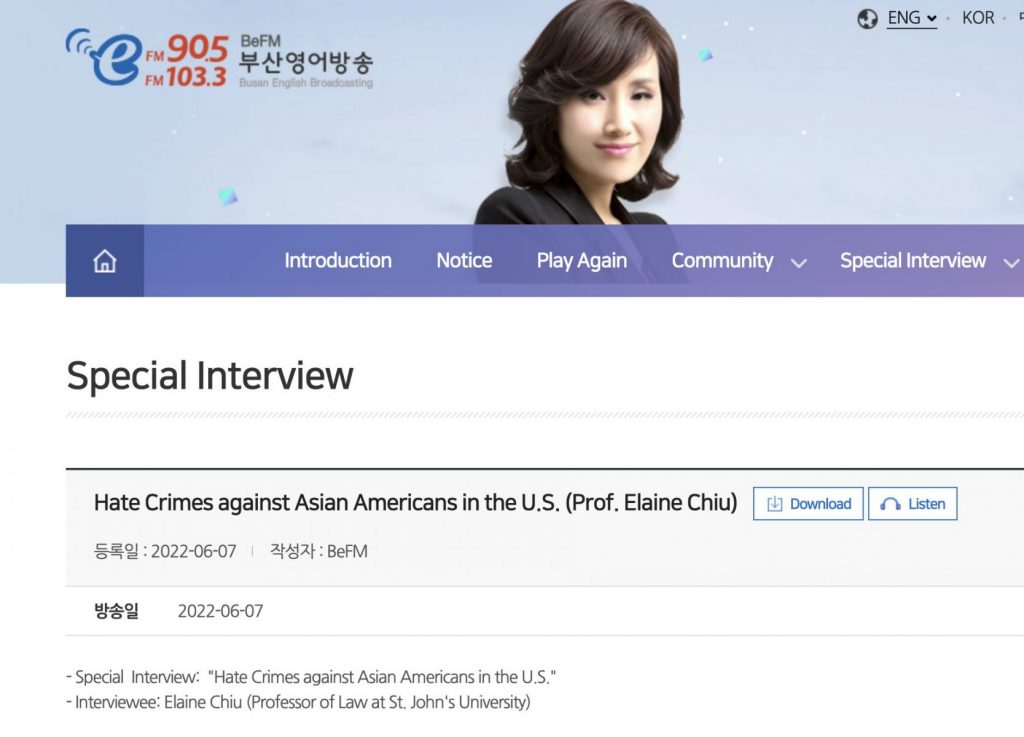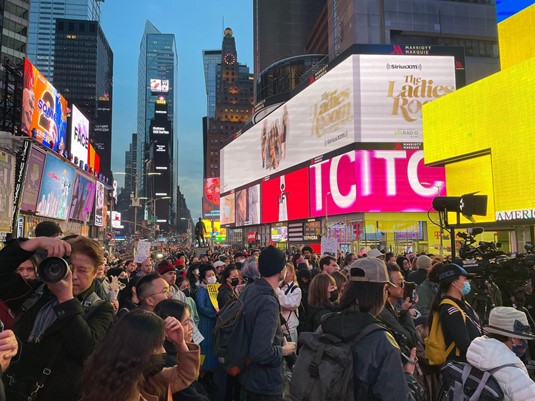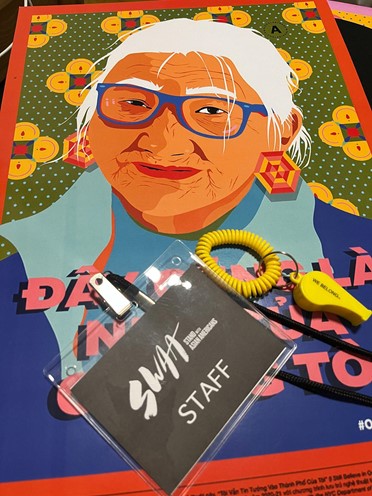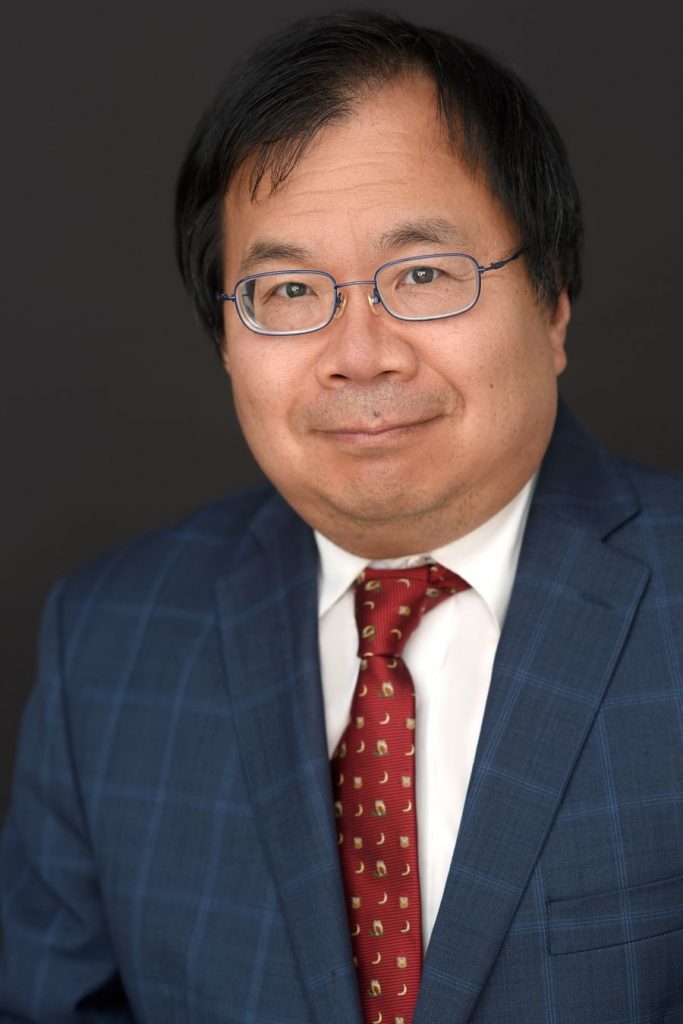“An attack against one Asian-American is an attack against all of us” – Gene Kang, Immediate Past President of Korean American Lawyers Association of Greater New York
On Tuesday, July 30, 2024, the Asian American Bar Association of New York (AABANY) and the Korean American Lawyers Association of New York (KALAGNY) organized and led a court-watching event at the New York Supreme Court. The event was held to support Christina’s family at the sentencing of Assamad Nash, who pleaded guilty to one count each of Murder in the Second Degree and Burglary in the First Degree as a Sexually Motivated Felony. Nash was sentenced by Hon. Laura A. Ward to 30 years to life in prison for the brutal murder of Christina Yuna Lee.
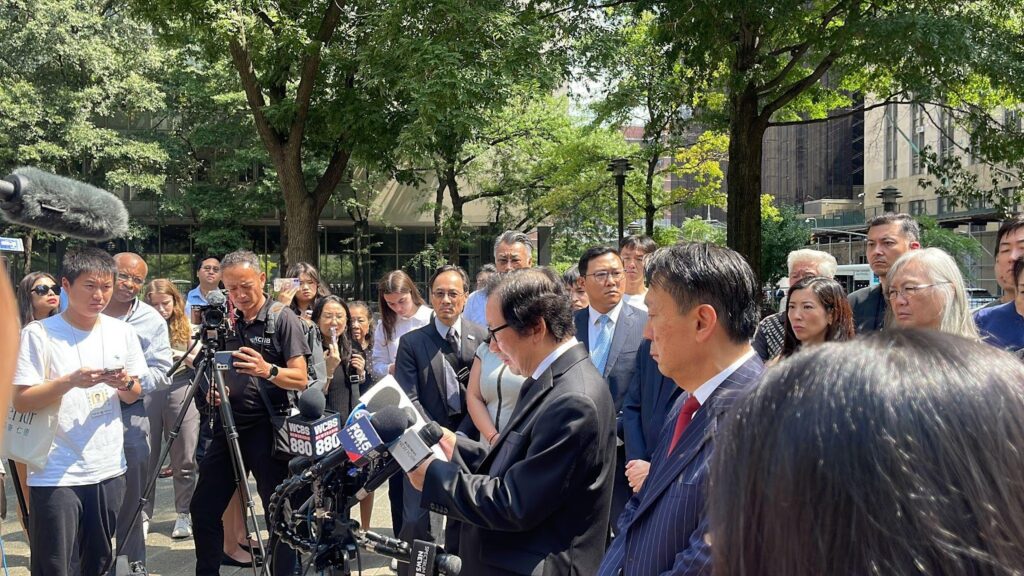
Sungkon Lee, Christina Yuna Lee’s Father
Christina Yuna Lee’s life was tragically cut short on February 13, 2022, when Nash broke into her apartment and stabbed her more than 40 times. On June 18, 2024, Nash pleaded guilty. His sentencing on July 30, over two years since the tragedy, marks a step toward justice for her family.
On the morning of the sentencing at approximately 9:30 AM, a crowd gathered in the hallway outside the courtroom, unified in purpose and voice. Among them were members of the Asian American community, standing in solidarity to seek justice for Christina Yuna Lee. Organizations such as Stand with Asian Americans, the Korean American Family Service Center, and the Committee of 100 were among the many groups present. Reporters and journalists waited outside the courtroom for the arrival of Lee’s father, Sungkon Lee, and her aunt, Boksun Lee, who were accompanied by their attorney, Charles Yoon, and friends.
Inside the courtroom, the audience awaited the arrival of Assamad Nash. When he was brought in, Ms. Lee shed a few tears upon seeing the man who had murdered her niece. Christina’s father, Sungkon Lee, and her aunt, Boksun Lee, took the stand first with their victim impact statements.
Sungkon Lee’s voice trembled with emotion as he spoke about his daughter’s vibrant spirit and the immense void her death had left in their lives. He painted a picture of a loving daughter whose dreams and potential were cruelly cut short, urging the court to impose the maximum sentence for the senseless act.
Boksun Lee spoke in Korean, with her words translated for the court. Her speech was a heartfelt plea for justice, highlighting the deep familial bonds they shared and how Christina was like a daughter to her. She explained that Christina’s mother was unable to attend because it was too difficult for her to face her daughter’s murderer. Boksun shared that Christina’s mother still struggles to eat, demonstrating that even after two years, they continue to contend with the trauma and pain.
The bravery of the father and aunt in standing before the judge, sharing their thoughts, and facing Mr. Nash left the audience saddened and teary-eyed listening to the emotional details they recounted.
After their statements, Manhattan Assistant District Attorney Dafna Yorna addressed the Court to read an excerpt from a letter jointly submitted by the Korean American Lawyers Association of Greater New York (KALAGNY) and the Asian American Bar Association of New York (AABANY). She read out this part of the letter:
Ms. Lee’s violent death deeply shocked New York City’s AAPI community, which has been suffering from numerous attacks, especially since the pandemic. A sentence of 30 years to life is just and commensurate with the brutal and senseless nature of Defendant’s crime, which caused Ms. Lee to suffer while he attempted to sexually assault her and repeatedly stabbed her with a kitchen knife until she died. Additionally, the sentence is necessary to send a message that leniency will not be shown to perpetrators of these types of violent crimes against Asian Americans, which would help deter this type of conduct in the future. Sentencing the Defendant to 30 years to life would not only ensure that he remains off the streets of our city, where many Asian Americans in recent years often fear for their safety, but it would also help the healing process for Ms. Lee’s family as well as the AAPI community, which is still struggling to recover from the surge in hate crimes in New York.
Justice Ward then directed her attention to Mr. Lee and addressed the courtroom, stating, “No parent should have to bury their child.” The courtroom was silent, as everyone collectively reflected on the senselessness of the crime and the profound impact it had on the family and the community. When asked if he had any final words, Mr. Nash remained silent.
Following the sentencing, a press conference was held at Collect Pond Park, across the street from the courthouse, led by Charles Yoon, attorney for the Lee family. Sungkon Lee addressed the crowd, focusing on two systemic issues that contributed to the tragedy: New York State bail reform and inadequate police response. Mr. Lee highlighted how New York State’s bail reform laws allowed Nash to be free at the time of the murder. He argued that these laws failed to protect innocent citizens and demanded accountability from elected officials and law enforcement. Prior to the murder, Nash had been charged with the illegal sale of a subway fare, escaping from the police after being caught damaging MetroCard machines, and punching a commuter in the face. During his arraignment for those charges, Nash was freed without having to post bail. Mr. Lee also criticized the police response, which took over an hour and twenty minutes to enter the apartment, even though they had arrived on the scene within a few minutes. The family announced their lawsuit against the city and urged the Mayor to name a homeless shelter in Christina’s honor as a preventative measure and a tribute to her memory. Lee’s words were a powerful call for reform and accountability, highlighting the need for systemic change to prevent similar tragedies.
Several community leaders spoke at the press conference, expressing their support for the Lee family and their commitment to advocating for justice.
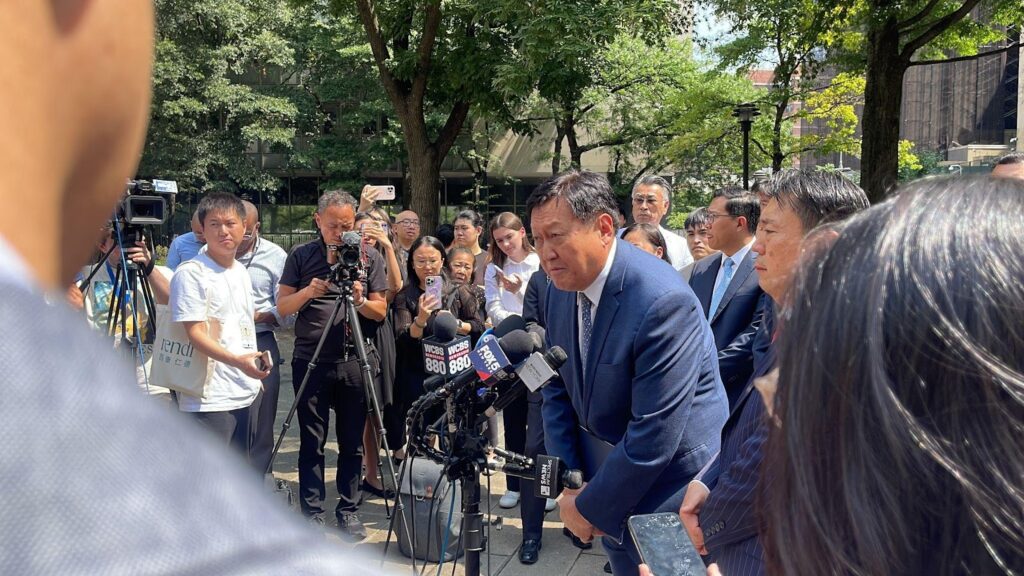
Kwang Suk Kim, president of the Korean American Association of Greater New York (KAAGNY)
Kwang Suk Kim, president of the Korean American Association of Greater New York (KAAGNY), delivered a brief yet impactful message. He emphasized the importance of commemorating Christina’s life through public facilities, ensuring her legacy would serve as a reminder of the community’s strength and resilience. He pledged KAAGNY’s support for initiatives that would honor Christina’s memory and promote community safety.
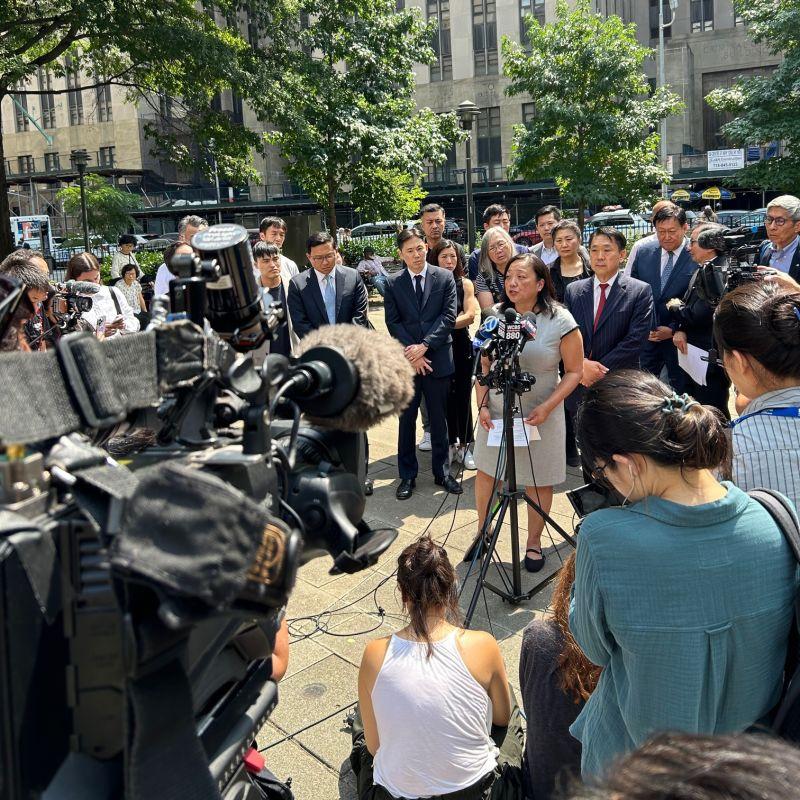
Elaine Chiu, Professor of Law at St. John’s University and past Chair of AABANY’s Anti-Asian Violence Task Force
Elaine Chiu, a Professor of Law at St. John’s University and past Chair of AABANY’s Anti-Asian Violence Task Force, spoke next, on behalf of AABANY. She highlighted the significance of Christina’s murder as a focal point in the ongoing crisis of anti-Asian hate and violence. “Even though this case was not charged as a hate crime, the truth was that yet another Asian New Yorker died a gruesome and violent death, one that she had done nothing to provoke, nothing at all,” she stated. Chiu added, “Many of our friends and family, our elderly relatives, our neighbors were afraid, deeply afraid, and for more than a year, many of us had stopped going out, stopped going out at night, stopped taking the subways and other public transportation, stopped speaking their first languages out in public, and making eye contact with strangers, out of fear.” Chiu emphasized that the community must remain vigilant, participate actively, and speak out and stand up for justice. She highlighted the importance of using the rule of law to combat hate crimes and ensure justice for victims. Chiu also cited AABANY’s court-watching initiative as a way to support victims and their families by bearing witness in the courtroom and demanding accountability.
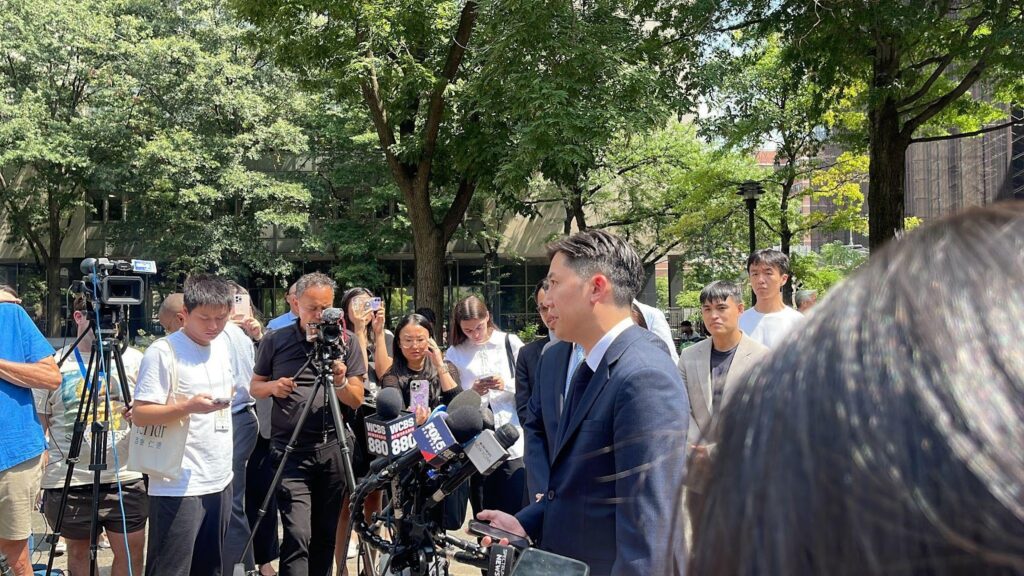
Lawrence Han, president of KALAGNY
Following Chiu’s address, Lawrence Han, president of KALAGNY, offered prayers and thoughts to Christina Yuna Lee’s friends and family, stating that the sentencing, though a small measure of justice, served as a stark reminder of the commitment to stand against hate and advocate for safety. He urged the community to work together to overcome hate and violence, emphasizing the need for solidarity and vigilance.
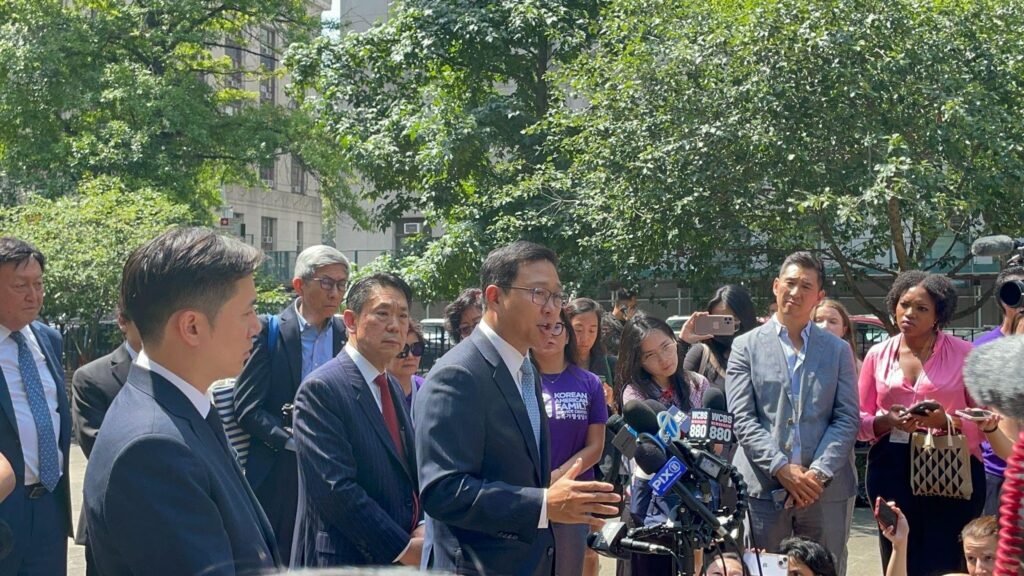
Gene Kang, the immediate past president of KALAGNY
Lastly, Gene Kang, the immediate past president of KALAGNY, delivered remarks emphasizing the importance of sending a strong message that violence against the Asian community will not be tolerated. He called on prosecutors, including Manhattan DA Alvin Bragg’s office, and law enforcement to “remain vigilant and zealously prosecute crimes against Asian Americans.” Kang also urged elected officials to reconsider plans for additional homeless shelters in predominantly Asian areas to prevent similar tragedies. He concluded his remarks by stating, “An attack against one Asian American is an attack against all of us.”
The court-watching event also prompted personal reflections from attendees who were moved by the proceedings and the sense of community solidarity. Emily Kam, an AABANY intern, shared her thoughts: “I felt sick, without direction or purpose. It seemed as though we would never be able to fully prevent sick acts such as these from happening. But I found comfort in Mr. Lee’s words as he spoke at the press conference. To preserve her memory, Mr. Lee discussed his wishes to establish a homeless shelter in Christina Yuna Lee’s name. A spur of hope persevered within me, despite the circumstances. To watch how strong this family was in the face of such adversity, to watch how they were already thinking of the future and its promises was inspiring to watch.”
Rita Zheng, another attendee and AABANY intern, echoed a similar sentiment. She shared: “Although I could not see [the face of Christina’s father Sungkon Lee] from where I was sitting, his sobs between words were audible throughout the courtroom. Every attendee gave him their full attention as he described the anguish he felt due to his daughter’s passing, stating that his family will ‘continue to live in unbearable pain.’ [Boksun Lee, Christina’s aunt] … stated that the sentencing of this case did not matter to her, as all she wants is to have Christina back and sincerely hopes that this never happens to anybody else in the community. I agree with this sentiment – the crime had already been committed and while it is important that justice is served and leniency is not shown, what is more important is that this never happens again. As the prosecutor had stated, no parent should go through the heartbreak that is burying their own child. No one’s life should be taken abruptly from them.”
As the press conference concluded, attendees felt renewed hope and determination. The tragic loss of Christina Yuna Lee reminds us of the need for change and has inspired community leaders, legal professionals, and activists to collaborate to prevent future violence. The Asian American community in New York City is dedicated to transforming this tragedy into a catalyst for promoting safety, unity, and justice for all. The words spoken during the court hearing and press conference serve as a reminder that the fight against hate and violence goes on. The community remains vigilant in advocating for justice and ensuring that Christina’s legacy lives on through safer communities. Because an attack against one Asian American is an attack against all, the community must stand united in its commitment to justice and equity.
AABANY thanks the many organizations, leaders, and individuals who supported the Lee family during this culmination of a long ordeal. Our solidarity sends a strong message that violence and hate will not be tolerated. Through collective action, advocacy, and remembrance, we honor Christina Yuna Lee’s memory and strive for a just and equitable future.
If you need help navigating the courts and legal system as a victim of anti-Asian hate, please reach out to AABANY’s HEART (Hate Eradication Active Response Team) and the Anti-Asian Violence Task Force (AAVTF). We’re here to help, support, and advocate. These efforts are vital in preventing future tragedies. As the community moves forward, it does so with renewed determination to create a world where everyone can live without fear.
Special thanks to Elaine Chiu for organizing this court-watching event.
Written by Daphne Mei, Program Manager, AABANY Anti-Asian Violence Task Force



